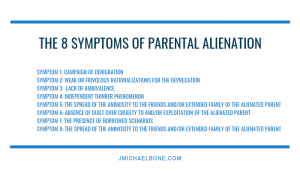Articles Posted in Parental Alienation
From Dr. Michael Bone: Expert on Parental Alienation

Parental Alienation in Narcissistic Relationships
This is a particularly good article that was sent by a past client of our Firm. I am fortunate that many of my current and past clients stay engaged with the literature and groups that deal with Parental Alienation, to the point that they wish to share the benefits and knowledge of what they may have acquired as we worked on their case, and the client witnessed for themselves the identification of these alienation scenarios and the strategies that I have developed (with the benefit of the insights of many great clinicians, authors and PA experts through the years).
This article is quite good and focuses on an important issue for today: Why We Persevere and Stay on Course for the Child Victims of Parental Alienation. These children are being harmed by the PA. Most love their targeted parent, but have been coerced and brainwashed to reject the loving parent. This sentence, from Dr. Stines’ essay, captures the point: It is much easier to reject someone you know will never leave, than it is to reject someone you can barely hold on to.
Strategy, Perseverance, Patience. Three of my many keys to managing these cases.
Illinois Divorce: Parental Alienation and Strategies

Illinois Divorce; High Conflict Cases and Splitting
Many years ago, I helped a bit with Bill Eddy’s first book, a landmark publication called Splitting that discussed and defined for the first time what it can be like to go through a divorce with a High Conflict Personality, such as a person with BPD or NPD traits. Here is a video from one of Bill’s series, discussing the analogy between splitting in politics, and the splitting that can occur in divorce.
Splittign behaviors can lead to conflict distortions, false allegations, and parental alienation, in a divorce and child custody case. It is always good to understand these phenomena, and to appreciate ways to manage them successfully in a divorce case.
Illinois Divorce: Parental Alienation: What Can a Parent Do?
Parental Alienation: What Can an Alienated Parent Do?
Credit: Susan Heitler Ph.D.
Illinois Divorce Blog: Senate Bill 4113 and the 50/50 Parenting Time Presumption
I have included below most of the text of the amended Illinois SB 4113, which seeks to establish a rebuttable presumption that an award of equal parenting time to each parent is in the best interests of the minor child(ren) in a divorce case.
For many years, my firm has represented Fathers in complex child custody cases, and in many cases my Dad clients were rightfully awarded the primary custody of their children. I have fought vigorously to level the playing field for my Dad clients through the years, some who faced false allegations, false OPs and other challenges in their divorce cases. These cases can be battles, but with the right strategy and management, the right decisions can be reached in these cases. Equally so, I have fought for women, in their own custody cases, some facing false allegations of parental alienation from a narcissistic husband. My goal has always been to develop strategies for both my male and female clients to combat parental alienation, false allegations, and to create outcomes that serve both my clients and the true best interests of the children.
So with SB 4113, the question becomes whether this legislation will, in and of itself, create that level playing field for parents? I note that many of the more vocal Bar associations have opposed this bill, and I can say that some judges with whom I have discussed this do not favor the bill. But, the idea of such a bill has a lot of favor, especially with men and women who, for too long, have been impacted by a legal system that oftentimes does not serve the best interests of children fully. Will SB 4113 create that foundation so that the court is required to factor in a presumptive 50/50 allocation of time to both parents? I am hopeful that SB 4113 perhaps undergoes some revisions that might make its passage more palatable. I note that a 50/50 presumption is a satisfying idea, but that in many cases, many judges and clinicians do not believe that a 50/50 time allocation is appropriate in most circumstances and with most families. An equalization of time is beneficial where the parents live proximate to each other, where the parents both share positive parenting traits, work schedules can accommodate 50/50 time, the age and circumstances of the kids favor shared time, and myriad other factors that can benefit a true shared parenting environment. I believe that a shared parenting bill could be written that might be more dense, more detailed and more fleshed out that might give a solid and detail-rich shared parenting bill a real likelihood of passage.
Illinois Divorce: High Conflict PD Cases and Divorce
I came across this podcast that features Megan Hunter, and offers some useful information about Personality Disorders and Divorce. A significant of my practice involves divorces and child custody issues that feature traits of personality disorders that affect the custody and wellbeing of children. Megan distinguishes between a situational aspect of divorce, where parents under high stress exhibit negative behaviors, and that of divorces that involve Personality Divorces, False Allegations, and potentially toxic levels of Parental Alienation.
Megan is an executive with my colleague Bill Eddy’s High Conflict Institute. Bill Eddy is the author of Splitting and I was privileged to work with Bill and Randi Kreger on the 1st Edition of Splitting, having offered the name of the book to Bill (it was a natural thought…splitting indicating a synonym for a divorce, and the psychological phenomenon that some PDs have), providing some limited content, and writing the foreword for the 1st Edition.

Megan Hunter is the CEO of Unhooked Media – a company focused on relationship and conflict resolution through print, digital, and the spoken word. She is the co-founder of the High Conflict Institute and currently serves on the Advisory Board of the Personality Disorder Awareness Network.
Parental Alienation: An Extreme Custody Case to Review
A lot of the work that I do for my clients that contact me involves issues with Parental Alienation. Parental Alienation can take many different forms, from a low grade “gatekeeping” function where a parent fails to support the parentign of the other parent in a divorce, to more toxic kinds of cases, where a disordered parent targets the other parent with a campaign of false allegations, and/or conducts a campaign of “brainwashing” of the minor children to share the same hate and contempt that the alienating parent has for the targeted parent.
A case from the state of Maine came into focus this week, and involves a mother claiming in a very toxic and high conflict divorce that the father of the minor female child had sexually abused the child. The mother, with a Ph.D. and backed by financial resources, conducted a campaign to have her husband (then unemployed) found to be liable for both child sexual abuse and domestic violence. It should be noted that any claims of child abuse and domestic violence must be taken very seriously, and all forensic and legal tools employed to determine whether a child has been harmed. However, in some cases, the claims of abuse are false and are part of a campaign to destroy a parent’s relationship with a child.
One example of a claim made: ” On or about the week of June 13, 2011, H (mother) made yet another false claim with DHHS, claiming that M (father) was poisoning the minor child with methamphetamines andthat Malenko possessed child pornography on his computers. Just after this Order entered, H contacted DHHS and made claims that M had hit the child in the head with a frying pan. These claims were all false. As a result of these false claims, the then four year old child had an invasive medical exam conducted at Maine Coast Memorial Hospital with H’s consent.”
 Illinois Divorce Lawyer Blog
Illinois Divorce Lawyer Blog

